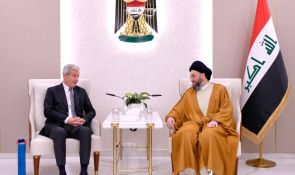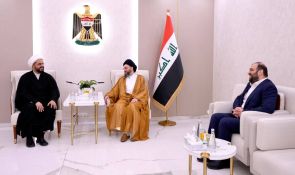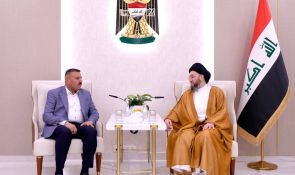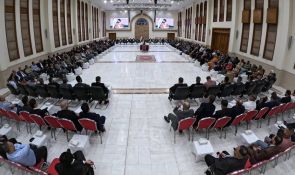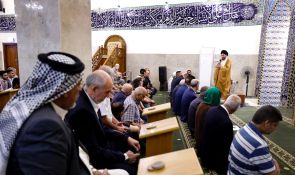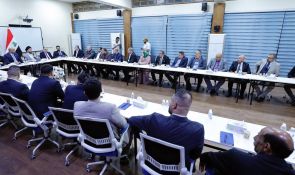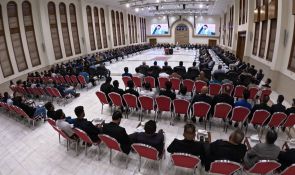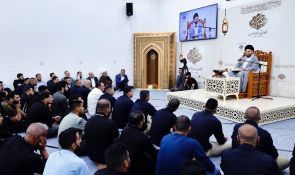Sayyid Ammar Al Hakim Underlines that Demonstrating is a Constitutional Right and Considers as “Abominable” the Way Security Apparatuses in Some Provinces Handled the Demonstrations
The head of the Islamic Supreme Council of Iraq underlined that the Martyr of the Niche movement is the first to have demanded the elimination of privileges granted to special ranks, a demand that was based on the movement’s ethics. His Eminence explained that the Citizen Bloc was the first to have requested the cancellation of privileges, refusing all attempts of overbidding and stressing that the solution for the retirement of parliamentarians is through balance, objectivity and calculation of their service like other civil servants as they should not be given a life-long salary and be deprived from their years of service in the parliament. His Eminence indicated that a parliamentarian is a regular citizen who must enjoy the rights of citizens, hoping that the unified retirement law mentions this balance vision. Sayyid Al Hakim explained in his speech at the weekly cultural meeting held in his Baghdad office, on Wednesday, 4/9/2013, that demonstrating is a constitutional right as long as it remains within the democratic political action, urging civil society organizations to educate people on the need to demand their rights without over exaggerating the weight of demonstrations and describing them as a revolutionary movement or the like. His Eminence pointed out that the alertness and harshness of security apparatuses in handling the demonstrations in some provinces are unjustifiable and described them as “abominable”.
Security Apparatuses Should Distinguish Citizens Demanding their Rights from Terrorists
Sayyid Ammar Al Hakim called upon security apparatuses do distinguish terrorists from citizens demanding their rights, indicating that the disciplined behavior of security officers in dealing with citizens is an indicator of the level of democracy in a country. His Eminence promoted the security institution to educate their affiliates on the behavior required to deal with similar situations, reiterating his warning against the behavior of some security apparatuses and the incident involving the late Karbala football coach, Mohamed Abbas, which sounded the alarm. His Eminence hoped that the news on the death of one of the arrested demonstrators in Dhi Qar are unfounded or exaggerated.
Iraq Does not Suffer from a Leadership Crisis but from a Management Crisis
His Eminence emphasized again on the significance of managerial revolution, indicating that management is involved in all political, economic and security aspects as well as in internal, foreign and international relations, which stresses the need for a managerial revolution in various areas. He pointed that problems were first born since the royal era, then management deteriorated in the republican area. Commands became prevalent after the military control and state institutions are still disregarding the modern management techniques and essential notions like the management of crises and national relations. His Eminence considered that learning from others’ experiences is not shameful and that the shame is in using managerial behaviors that show how far behind we are from the world. He stressed that Iraq does not suffer from a leadership crisis as it has produced many leaderships but from a management crisis.
We Call for a Major Pedagogical and Educational Awakening that Deals with the Current Education Situation
The Head of the Islamic Supreme Council of Iraq mentioned that the new school year is about to start, indicating that upbringing is inherent to education for both are a guarantee for building a future generation capable of confronting challenges. His Eminence expressed his regret facing the Iraqi education system’s need for development and the incompetency of its tools, detailing the needs as being mainly the shortage in school buildings, their lack of adequate equipment and their old designs. Other countries have used for their schools architectural designs that encourage students to spend an enjoyable time. His Eminence pointed that Iraqi schools lack comfortable chairs, air-conditioned classrooms, science laboratories and sterilized water, calling for a major pedagogical and educational revolution that deals with the current situation of education and stressing that progress is based on the development of education and pedagogy without which no promising future generation can be built.
The Ministries Deal with the Real and Urgent Needs of Provinces in a Repulsive Routine Manner and Sometimes with Carelessness
His Eminence pointed out to the suffering of provinces: They are trying to provide the promised services, while they want to spread security among the citizens, which makes the administrative system of the provinces stuck in a corner where no governor can take control of the developmental and economic mechanism of his province given the association of the tools with the ministries in the center. He added that the ministries deal with the real and urgent needs of provinces in a repulsive routine manner and sometimes with carelessness, explaining that the security dossier tools are within the hands of the center, while its negative impacts are assumed by the citizens and the administrative system of the province. He considered that the large amount of blocked central laws is a stumbling block between the provinces and the development, arguing that most of the decisions are beyond the powers of the provinces especially as far as the sensitive topics are concerned, calling for effective and quick solutions that go along with the urgent needs of the provinces by reconsidering a number of decisions and procedures that hamper the provinces.
The Transfer of the Ration Card for the Provinces is a Good, Effective Step
His Eminence considered the transfer of the ration card for the provinces as good, effective step, calling on the provinces to rely on providers with high level of competence and experience, and establish worldly recognized centers to check the food. He stated that the logic of the ration is not about delivering minimum food, but controlling the market prices especially the main food, warning corruptors and manipulators who manipulated the rations and commissions that their monies are ill-gotten and they spent them on themselves and their children, and the ill-gotten property and the dirty money cannot be justified by providing charity to the poor, taking care of orphans or performing the religious rituals, because we cannot obey Allah by doing the things He forbids. Thus, he called on the governors to get prepared for the autumn and winter seasons and work hard to compensate the lack in the electrical power as well as for the summer away from the complicated and routine procedures of ministries. For him, the ultimate solution of the electricity dossier is to proceed with privatization, evoking here the experience of the region of Kurdistan in this regard.
To Consider the Refugees in Rafha Camp as Political Prisoners Is a Victory for the Injustice and Restitution of Rights
His Eminence thanked all those who contributed to the passing of the law concerning the refugees of Rafha camp and them being considered political prisoners, giving special thanks to the parliamentary Citizen Block which adopted the law, confirming the gratitude of everybody to the inhabitants of Rafha camp and what they offered to the Iraq people, since they brought the injustice they are suffering to the international decision-making circles. In his opinion, to consider the refugees in Rafha camp as political prisoners is a victory for injustice and restitution of rights, even if this comes late, because the right never prescribes with time.
On the region level, his Eminence pointed out to the international caution in dealing with the Syrian issue and its consequences. According to him, the realistic analysis of the caution shows that the international community is now more rational and poised in dealing with the overlapping events and issues, including that of Syria. He stated that at the review of the list of enemies and allies in the Syrian issue, things become appalling; therefore, finding the truth becomes one of the most complicated and difficult missions. And this is, his Eminence added, what pushed the international community to deal with caution and prudence with Syria. To him, there is also another unveiling indicator, which is the popular influence and pressure on the political decision. He explained that the if the military strike against Syria were to occur, it would be limited with an aim to re-maintain balance between both camps, calling for seriously considering the initiative of the Iraqi government since it is equilibrated and safeguards everybody's interests.


